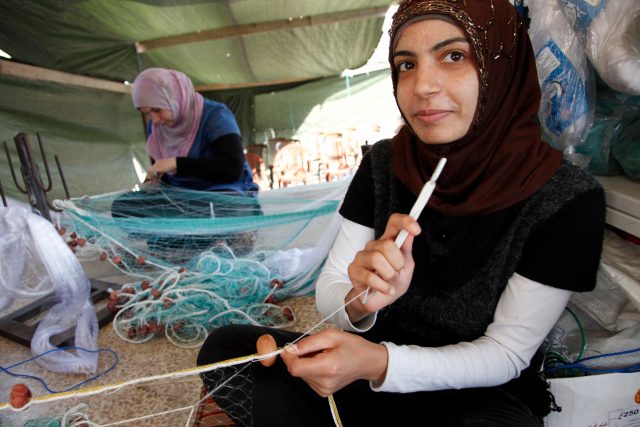
This article is the seventh in a series on ‘Women, Peace and Security’ that The Strategist will publish over coming weeks in recognition of International Women’s Day 2018. Eds.
Women’s empowerment and equality are vital to achieving international and national security and stability. Empirical research has demonstrated that women’s advancement is key to reducing political violence. It’s therefore crucial that women occupy a seat at the negotiating table when designing and implementing programs or policies concerning security and development, including those related to counterterrorism and preventing/countering violent extremism (P/CVE).
There has been international recognition through various UN Security Council resolutions of the diverse roles that women play relative to political violence (including in the prevention and resolution of conflicts, perpetrating violence, peace-building and reconstruction).
Still, very little progress has been made towards recognising P/CVE as an integral component of the women, peace and security (WPS) agenda. This is predominantly due to long-term concerns about the operational and conceptual challenges to integrating P/CVE within WPS.
There are three clear barriers towards integration. Firstly, the conceptual discussions and operational implementation of P/CVE needs to be separated from those about counterterrorism, which are perceived to be rooted in hard security practices such as military and intelligence operations.
Secondly, as Chantal de Jonge Oudraat astutely points out in A man’s world?, good practices for aligning WPS and P/CVE are made more difficult due to engrained gender roles within the two fields. Women predominantly lead in WPS. In contrast, P/CVE has traditionally been understood as an extension of security and intelligence operations, where men generally lead.
Academics and practitioners internationally have corroborated this view. For example, the LSE’s ‘Key Issues Report on P/CVE and WPS’ and the Global Counterterrorism Forum’s ‘Good Practices on Women and CVE’ papers highlight the inadequate levels of gender training among P/CVE practitioners. They also point to an insufficient understanding of how to situate gender equality sustainably at the heart of P/CVE.
Finally, there exists a fundamental distrust between WPS and P/CVE practitioners to carry out their respective priorities to appropriate standards. For example, WPS practitioners are concerned about the danger of P/CVE policy and practice ‘instrumentalising women’s rights and gender equality for intelligence purposes’. While it’s fair to say that promoting gender equality traditionally hasn’t been integral to the international community’s response to extremism, it’s also necessary to recognise that this isn’t always the case.
P/CVE is still a relatively underdeveloped field, with no single definition, objectives or goal. The WPS agenda must take this into consideration and not unilaterally write off P/CVE agendas due to perceptions about the hard-security focus that most governments initially favoured.
As P/CVE research has developed, far more nuanced policy and practice have been developed. An outcome of this is that there’s much more diversity in interpreting the extent of law enforcement involvement in P/CVE. Especially in prevention, there appears to be an attempt to move away from hard security and intelligence-led approaches towards non-coercive measures rooted in social policy.
P/CVE initiatives can take many forms, but a common thread emphasises the importance of dialogue and education, especially through coordinating government and non-government actors. So P/CVE policy and programs don’t necessarily tackle violent extremism directly. Rather they focus on building resilience, and promoting the values of citizenship and human rights. These objectives don’t differ extraordinarily from those advocated by WPS proponents.
There are a number of grassroots programs internationally that are doing excellent work to engage women in a broad range of P/CVE programs that also address the WPS agenda’s core priorities. These initiatives bridge the gap between P/CVE and WPS.
Examples of best practice and lessons learned in P/CVE initiatives internationally appear in recent papers from The Berghof Foundation and The GSDRC. Reading those programs’ aims and objectives makes it clear that there are links between WPS and P/CVE agendas that could be harnessed, allowing for a deeper and more holistic understanding of women’s roles in political violence.
For example, a pilot initiative in Lebanon called Empowering Women Countering Extremism trained and empowered young professionals (men and women) in the area of women’s involvement in CVE online and offline. The goal was to equip individuals with the necessary tools to understand and protect human rights values by promoting ‘peaceful coexistence, interfaith dialogue and reconciliation’.
Research has demonstrated that women’s rights directly affect national and international security and stability. For example, in Bangladesh, poverty is one of the main drivers of radicalisation towards violent extremism. As such, the government has integrated gender perspectives into their long-term CVE strategy, which aims to lift women and girls out of poverty by promoting education, business opportunities and employment initiatives.
The barriers to aligning the WPS and P/CVE agendas should be slowly and cautiously dismantled. As Australia prepares to develop its second national action plan, it’s important to pay attention to the work that is being done by women internationally in the P/CVE space to examine where there are mutual priorities and challenges.
If gender equality is a basic requirement to achieving peace and security, then we cannot ignore terrorism and violent extremism, which are key gendered drivers of insecurity and instability. There are clear opportunities for collaboration between WPS and P/CVE in knowledge sharing and skills development.
By continuing to pursue parallel agendas, as pointed out by Katrina Lee-Koo and Jacqui True, the WPS and P/CVE agendas miss these important opportunities. That stunts meaningful progress and sustainable development on both sides.

